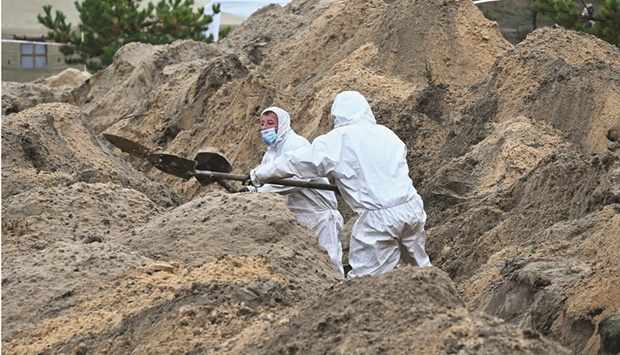Ukrainian President Volodymyr Zelensky has appealed to leaders of the Group of Seven nations for more air defence capabilities, and the G7 vowed to support Kyiv for “as long as it takes” while warning Russia against any use of nuclear weapons.
The North Atlantic Treaty Organisation (Nato) said that it is closely monitoring Russia’s nuclear forces following a string of Russian battlefield defeats in Ukraine and that the allies were also boosting security around key infrastructure after recent attacks on Baltic Sea gas pipelines.
Russian missiles again hit Ukrainian cities but with less intensity than on Monday, when dozens of strikes killed 19 people, wounded more than 100 and knocked out power supplies across the country in Moscow’s biggest aerial offensive since the start of its invasion on February 24.
More missile strikes killed at least one person in the southeastern Ukrainian town of Zaporizhzhia and left part of the western city of Lviv without power, local officials said.
Air raid sirens earlier wailed across Ukraine for a second day.
“When Ukraine receives a sufficient quantity of modern and effective air defence systems, the key element of Russia’s terror, rocket strikes, will cease to work,” Zelensky told G7 leaders at a virtual meeting where he again ruled out peace talks with Russian President Vladimir Putin.
Yesterday Ukraine received the first of four IRIS-T air defence systems Germany promised to supply, a German defence ministry source said.
Kyiv also expects to receive state-of-the-art US air defence systems.
Ukraine’s Western allies have pumped aid and heavy weapons to Kyiv since Russia’s invasion began.
Zelensky’s government has mixed gratitude with pleas for more powerful weapons and faster deliveries.
The G7 – which groups the United States, Germany, France, Japan, Britain, Italy and Canada – pledged continued “financial, humanitarian, military, diplomatic and legal support ... for as long as it takes” to Ukraine, it said in a statement.
Moscow, which calls its actions in Ukraine a “special military operation” to eliminate dangerous nationalists and protect Russian-speakers, has accused the West of escalating and prolonging the conflict by supporting Kyiv.
“We warn and hope that they realise the danger of uncontrolled escalation in Washington and other Western capitals,” Russian Deputy Foreign Minister Sergei Ryabkov was quoted as saying by RIA news agency yesterday.
Kyiv and the West accuse Russia of an unprovoked imperialist land grab in neighbouring Ukraine.
Putin, under domestic pressure to ramp up the war as his forces have lost ground since early September, said he ordered the strikes as revenge for an explosion that damaged Russia’s bridge to annexed Crimea last weekend.
In recent weeks, Moscow has annexed new tracts of Ukraine, mobilised hundreds of thousands of Russians to fight and repeatedly threatened to use nuclear arms, stoking alarm in the West.
Nato has not noticed any change in Russia’s nuclear posture following the threats, Secretary-General Jens Stoltenberg told reporters in Brussels yesterday.
Stoltenberg also said Nato allies would meet any attacks on critical infrastructure with a “united and determined response”.
It remains unclear who was behind explosions last month affecting gas pipelines under the Baltic Sea.
Moscow has denied any involvement and pointed the finger at the United States.
The alliance will proceed with its annual nuclear preparedness exercise “Steadfast Noon” next week – in which Nato air forces practice the use of US nuclear bombs based in Europe with training flights – without live weapons.
Meanwhile, Zelensky officially requested that Unesco add the historic port city of Odessa to its World Heritage List in a bid to protect it from Russian air strikes.
“We must provide a clear signal that the world will not turn a blind eye to the destruction of our common history, our common culture, our common heritage,” he told the 58 member states of the UN’s cultural watchdog in a pre-recorded video yesterday.
“One of the steps for this should be the preservation of the historical centre of Odessa – a beautiful city, an important port of the Black Sea and a source of culture for millions of people in different countries,” he said.
Known as the pearl of the Black Sea, Odessa blossomed after empress Catherine the Great decreed in the late 18th century that it would be Russia’s modern maritime gateway.
Tsar Alexander named as governor France’s Duc de Richelieu, who oversaw its construction and whose statue still stands atop its iconic Potemkin stairs.
However, since Russia invaded Ukraine in February, Ukrainians have rushed to try to protect its monuments and buildings with sandbags and barricades.
“Odessa, like all other cities of Ukraine, is a target for Russian strikes,” Zelensky said. “Please support Odessa! Show at the level of Unesco precisely that Russian terror must end.”
The UN cultural agency said Ukraine’s request would be reviewed during the next World Heritage Committee meeting, without giving a date.
The last session was supposed to be held in Russia in July, but was postponed due to the war in Ukraine.
The committee chairperson is currently Russian.

Forensics personnel exhume the body of one of more than 50 Ukrainian soldiers buried in one mass grave at a cemetery near Lyman, Donetsk region.
